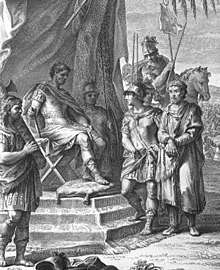Jugurtha
| Jugurtha | |
|---|---|
 Jugurtha in chains before Sulla, from Sallust's La conjuracion de Catilina y la Guerra de Jugurta (Madrid, 1772) | |
| Reign | 118 BC – 105 BC |
| Predecessor | Micipsa |
| Successor | Gauda |
| Born |
c. 160 BC Cirta |
| Died |
c. 104 BC Rome |
| Issue | Oxyntas |
| Father | Mastanabal |
| Part of a series on the |
| History of Algeria |
|---|
 |
|
|
|
|
Modern times |
|
|
Jugurtha or Jugurthen (c. 160 – 104 BC) was a king of Numidia, born in Cirta (modern-day Constantine).
Background
Until the reign of Jugurtha's grandfather Masinissa, the Numidians were semi-nomadic and indistinguishable from the other Berber tribes in North Africa. Masinissa established a kingdom (roughly equivalent to modern northern Algeria) and became a Roman ally in 206 BC. After a long reign he was succeeded in 148 BC by his son Micipsa. Jugurtha, Micipsa's adopted son (and Mastanabal's illegitimate son), was so popular among the Numidians that Micipsa was obliged to send him away to Spain.[1] Unfortunately for Micipsa, instead of quietly keeping out of the way, Jugurtha used his time in Spain to make several influential Roman contacts. He served at the siege of Numantia (134-133 BC) alongside Gaius Marius and learned of Rome's weakness for bribes. He famously described Rome as "urbem venalem et mature perituram, si emptorem invenerit" ("a city for sale and doomed to quick destruction, if it should find a buyer," Sallust, Jug. 35.10).
Rise to power
When Micipsa died in 118, he was succeeded jointly by Jugurtha and his two sons (Jugurtha's half-brothers) Hiempsal and Adherbal. Hiempsal and Jugurtha quarrelled immediately after the death of Micipsa. Jugurtha had Hiempsal killed, which led to open war with Adherbal. After Jugurtha defeated him in open battle, Adherbal fled to Rome for help. The Roman officials settled the fight by dividing Numidia into two parts, probably in 116, but this settlement was tainted by accusations that the Roman officials accepted bribes to favor Jugurtha. Among the officials found guilty was Lucius Opimius (who, as consul in 121, had presided over events which led to the death of Gaius Gracchus).[2] Jugurtha was assigned the western half; later Roman propaganda claimed that this half was also richer, but in truth it was both less populated and developed.[3]
War with Rome
By 112 Jugurtha resumed his war with Adherbal, penning the latter up in his capital of Cirta. Adherbal was encouraged to hold out by a corps of Italian residents, in expectation of military aid arriving from Rome. However, Roman troops were engaged in the Cimbrian War and the Senate merely sent two successive embassies to remonstrate with Jugurtha who delayed until he had captured Cirta. His troops then massacred many residents including the Italians.[4] This brought Jugurtha into direct conflict with Rome, who sent troops under the Consul Lucius Calpurnius Bestia. Although the Romans made significant inroads into Numidia, their heavy infantry was unable to inflict any significant casualties on Jugurtha's army which included large numbers of light cavalry.[4]
Bestia then accepted an offer of negotiations from Jugurtha, who surrendered and received a highly favourable peace treaty, which raised suspicions of bribery once more. The local Roman commander was summoned to Rome to face corruption charges brought by his political rival Gaius Memmius, who also induced the tribal assembly to vote safe conduct to Jugurtha to come to Rome to give evidence against the officials suspected of succumbing to bribery. However once Jugurtha had reached Rome, another tribune used his veto to prevent evidence being given. Jugurtha also severely damaged his reputation and weakened his position by using his time in Rome to set gangs onto a cousin, named Massiva, a potential rival for the Numidian throne.[4]
War again broke out between Numidia and the Roman Republic, and several legions were dispatched to North Africa under the command of the consul, Quintus Caecilius Metellus Numidicus. The war dragged out into a long and seemingly endless campaign, as the Romans tried to inflict a decisive defeat on Jugurtha. Frustrated at the apparent lack of action, Metellus's lieutenant, Gaius Marius, returned to Rome to seek election as consul. After winning the election, Marius returned to Numidia to take control of the war. He sent his quaestor, Sulla, to neighbouring Mauretania to eliminate their support for Jugurtha. With the help of Bocchus I of Mauretania, Sulla was able to capture Jugurtha and bring the war to a conclusive end. Jugurtha was brought to Rome in chains and placed in the Tullianum.

Jugurtha was paraded through the streets in Gaius Marius' Roman triumph after which his royal robes were removed and his earrings were ripped off. He lost an ear lobe in the process. He was then thrown into the Tullianum, where he died of starvation in 104 BC.[5] He was survived by his son, Oxyntas.
See also
- Jugurthine War
- Battle of the Muthul
- Sallust, De Bello Iugurthino
- Bomilcar (2nd century BC)
- Tacfarinas
References
- ↑ Sallust. "The Jugurthine War". p.6. (ed. John Selby Watson), Tufts Perseus Digital Library.
- ↑ Plutarch. [Lives of] Tiberius and Gaius Gracchus, c. 39. In: Waterfield, Robin. Plutarch, Roman Lives, pp. 114, 458 (note to p. 114) ISBN 978-0-19-282502-5
- ↑ Sallust (1963). The Jugurthine War/The Conspiracy of Catiline. Translated with an introduction by S. A. Handford (Penguin Classics ed.). London: Penguin. p. 53, footnote.
- 1 2 3 M. Cary & H.H. Scullard, A History of Rome, 3rd ed (1975), p214-6, ISBN 0-333-27830-5
- ↑ The Poison King: The Life and Legend of Mithradates by Adrienne Mayor page 112